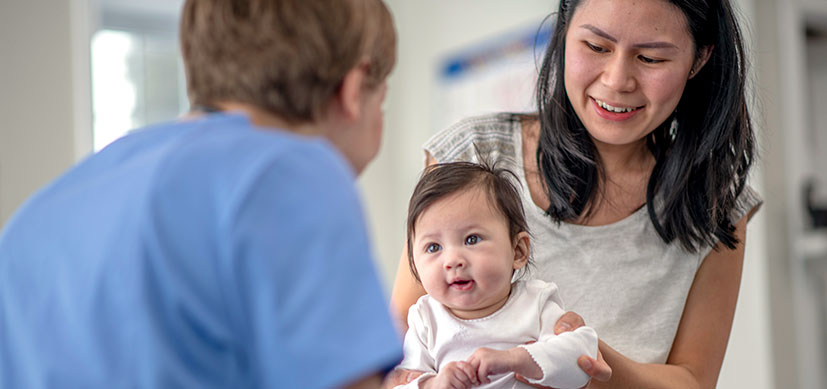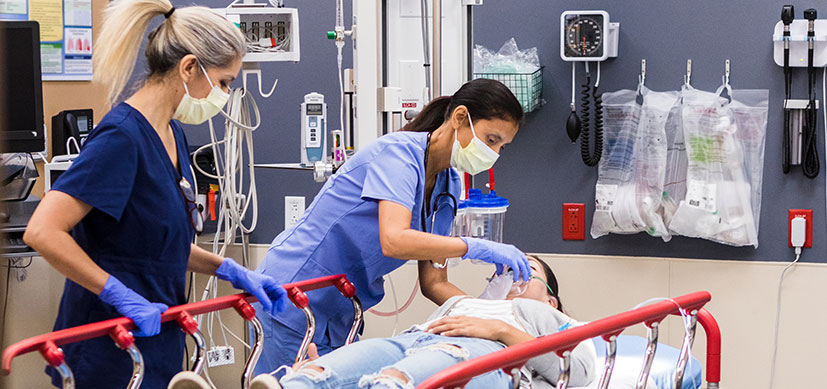Trauma-Informed Home Visits Support Mothers and Children
Research By: Alonzo T. Folger, PhD, MS | Robert T. Ammerman, PhD, ABPP
Post Date: April 27, 2022 | Publish Date: March 2022

“This new framework will allow us to fully develop and test an intervention within home visiting to better support mothers and their children.”
–Alonzo “Ted” Folger, PhD, MS
Home visiting began as a strategy to help prevent child abuse and neglect by supporting pregnant moms and new parents with learned skills and behaviors that promote nurturing, sensitivity and stimulating early environments. From pregnancy until children are 2 or 3 years old, trained preventionists visit families to offer regular education, modeling, screenings and linkages to community resources.
Research has shown that many of the mothers participating in these programs have likely experienced trauma, violence, abuse or neglect during their own childhood. In the Cincinnati region, 70% of mothers enrolled in home visiting programs have a history of childhood trauma, according to Every Child Succeeds, which serves nearly 2,500 at-risk families annually.
Childhood trauma contributes to later problems in psychological adjustment, interpersonal relationships, physical health, and parenting. These experiences also have a strong association with developmental risk factors for children of these mothers.
As a preventive strategy, it is important for home visiting programs to provide opportunities for mothers to heal and build the skills they need to support their children’s social-emotional development.
To help guide trauma-responsive professional development and interventions, researchers at Cincinnati Children’s documented current trauma-related knowledge and practices in the field. With funding from the Home Visiting Applied Research Collaborative, they surveyed 128 home visiting programs throughout the United States.
The results, coupled with in-depth interviews of home visitors, led to the development of five modules that can be readily incorporated into home visiting practices to address clinical issues common to mothers with trauma histories, depression, and low social support. The five modules were: behavioral activation, deep breathing, identifying social supports, building social skills, and future aspirations.
“We anticipate that the development of these new trauma modules will improve home visiting services locally and nationally,” says Alonzo “Ted” Folger, PhD, MS, Division of Biostatistics and Epidemiology, director of Evaluation and Epidemiologic Research for Every Child Succeeds, and co-principal investigator with Robert Ammerman, PhD, Division of Behavioral Medicine and Clinical Psychology and scientific director for Every Child Succeeds.
“The goal was to have modules that were theory-based, had a clear mechanism of change, and were practical, feasible, engaging, affordable and scalable,” Folger notes.
FIRST-EVER NATIONAL SURVEY OF HOME VISITING PROGRAMS
Several key themes emerged from the survey.
While home visiting agencies are moving towards embracing new trauma-informed approaches, one-third of programs do not ask about trauma.
“Both maternal depression and perceived social support are important constructs that link parental trauma to parenting challenges and offspring development,” Folger says. “It was interesting that while over 90% of programs screened for maternal depressive symptoms, only one-third asked about social support or isolation.”
Approximately half of the programs surveyed found it challenging to support mothers who have trauma histories and related intense emotions, shame and guilt. While 75% of programs have had training in trauma-informed approaches, more work is needed to evaluate their skills and provide further training.
Most home visiting programs also indicated on the survey that their programs could be more effective in addressing maternal depression and social-isolation. In fact, home visitors recognized the strong relationship between trauma, inadequate social support and depression. They identified social anxiety as significant impediments to accessing social support resources and growing supportive social networks.
“These agencies and visitors need more support,” Folger says. “They want more tools and strategies to build maternal skills in these areas.”
“Research has demonstrated that when care providers deliver services that are trauma-informed, they are more engaging and effective,” notes Ammerman. “Home visitors are already highly sensitive to the needs of mothers who have experienced trauma, but new approaches are being developed that are being incorporated into their training that emphasize how best to work with mothers who have been abused or neglected in childhood.”
“Every Child Succeeds has engaged experts in these areas to provide training that utilizes the most up to date approaches in the trauma field,” Ammerman says.
NEXT STEPS
The findings from this research have already stimulated new investments in trauma training for more than 80 home visitors in the Cincinnati region.
“We are excited that this work has contributed to a better understanding of trauma-informed knowledge and practices in the field of home visiting,” says Folger. “This new framework will allow us to fully develop and test an intervention within home visiting to better support mothers and their children.”
The research team hopes to further develop strategies that home visitors can use directly when working with parents who have experienced trauma, including strategies that help mothers manage their mood and prevent depression as well as build strong social networks and support systems.
FUNDING
This study was supported by a grant from the Home Visiting Applied Research Collaborative (HARC), the national home visiting research and development platform. Based at Johns Hopkins University, the goal of HARC is to advance innovative methods in home visiting research and the translation of findings into policy and practice. This was the very first grant awarded by HARC to advance the paradigm of precision home visiting.
ABOUT THE STUDY
Study contributors from Cincinnati Children’s included Nichole Nidey, PhD, Division of Biostatistics & Epidemiology, and from Every Child Succeeds Jennifer Frey, PhD, Judith Van Ginkel, PhD, Jennifer Berndsen, Margaret Clark, MPA, Lacy Dickerson, Stephanie Marston, and Beth Heeter.
| Original title: | Development of a Trauma-Informed Approach in Home Visiting |
| Published in: | Home Visiting Applied Research Collaborative (HARC) |
| Publish date: | March 2022 |
Research By









